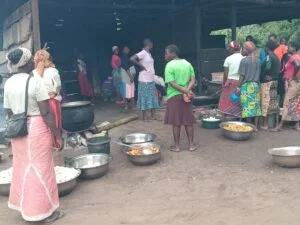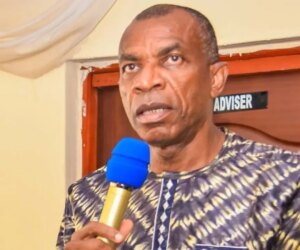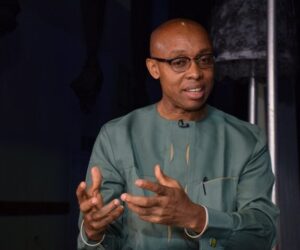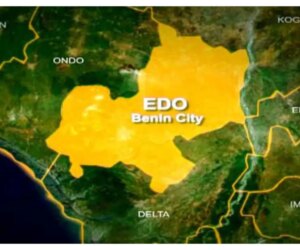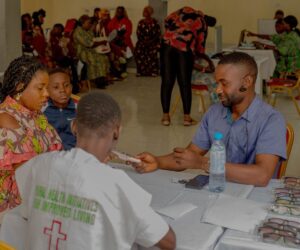From displacement to degrees: How an IDP camp in Edo is turning survivors into professionals
By Kevin Okunzuwa
When insurgency and herder-farmer violence swept through Borno and Adamawa States between 2010 and 2015, it left hunger, homelessness, and hopelessness in its wake.
Boko Haram’s attacks on police stations, schools, and churches forced millions to flee their homes.
Over 1,400 schools were destroyed, agriculture was disrupted, and food insecurity deepened.
According to the International Organisation for Migration, more than two million people remain internally displaced across Nigeria’s North-East.
A 2023 survey by the National Bureau of Statistics identified 340 Internally Displaced Persons (IDPs) camps across seven northern states.
Yet, 1,000 kilometres away in Edo, a quiet transformation is unfolding.
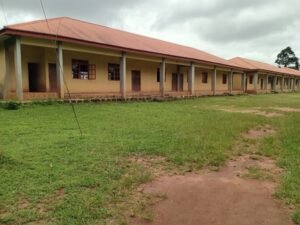
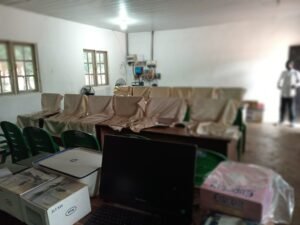
Computer science laboratory at the HfN
At the Home for the Needy (HfN) IDP Camp in Uhogua, just 25 kilometres outside Benin City, children who once fled gunfire are now graduating as doctors, lawyers, engineers, and other professions.
Their journey—from tents to degrees—demonstrates how education, mentorship, and community support can turn trauma into opportunity.
The Crisis and the Response
Originally founded in 1992 to care for orphans and vulnerable children, the Uhogua camp became a refuge for conflict survivors from northern Nigeria after 2012.
Today, it shelters over 3,000 IDPs, with thousands more living in surrounding villages.
Under the leadership of Pastor Solomon Folorunsho, the camp provides shelter, healthcare, food (much of it grown on-site), and free education from primary through tertiary levels.
“I was moved by the overwhelming spate of child neglect and insurgency,” Folorunsho told the News Agency of Nigeria (NAN).
“I only wanted to give these children a ray of hope. Seeing them graduate as doctors, lawyers, and engineers is proof that God is faithful,” he said.
Folorunsho stated that the foundation takes great care not to admit criminals or individuals of questionable character into the camp.
“We carry out background checks using information from relatives and traditional leaders in the home states of the displaced persons,” he explained.
“Often, we also seek the assistance of security agencies to ensure that those we admit are genuinely displaced and not persons with dubious backgrounds.”
He added that although many of the IDPs are of school age, the foundation conducts examinations and interviews to determine the appropriate class placement for each individual.
“Those who are either above school age or educationally disadvantaged are guided to choose a vocational training programme that suits their interests,” he said.
The camp’s achievements
Pastor Evelyn Omigie, one of the camp supervisors, noted that the home had produced no fewer than 85 graduates across medicine, pharmacy, law, and in other disciplines.
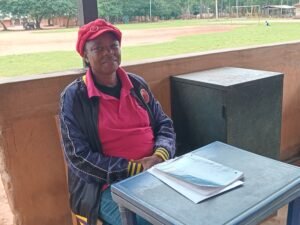
“Recent years alone have seen five medical doctors, several pharmacists, dozens of accountants, and multiple lawyers,” she said.
She spoke of Amos Ishaku, a former resident of the home, graduated from Edo State University, Uzairue, where he earned a First Class degree in Chemical Engineering in November 2023.

“He achieved a remarkable Cumulative Grade Point Average (CGPA) of 4.80, making him the best graduating student in the Faculty of Engineering.
“His academic excellence earned him several accolades, including the Mike Ozekhome Award for the overall best graduating student and the Best Student awards in both the Department of Chemical Engineering and the Faculty of Engineering .
“Additionally, Ishaku was honoured with a ₦2.5 million Entrepreneurship Award for his outstanding business proposal during his time at the university .
“In August 2024, he secured a fully funded PhD scholarship at the University of Illinois, Chicago, U.S, marking a significant milestone in his academic journey,” she said.
Folorunsho further told NAN that no fewer than 147 survivors in the camp recently completed the Senior Secondary School Examination (SSCE).
He said: “We were able to register 147 of our children in the just concluded NECO and NABTEB examination.
‘’140 out the 147 sat for the Joint Admission Matriculation Board (JAMB) examination, and they did very well as one person scored above 300 and more than 123 scored above 200.
‘’However we are expecting admission for about 145 of them taking into cognisance the released cut off mark for admission into tertiary institutions by JAMB some time ago.’’
The coordinator also told NAN that six of the survivors were currently undergoing the mandatory National Youth Service Corps (NYSC) programme, while five were recently called to the Nigerian Bar.
As a way of giving back, camp residents engage in teaching in the camp’s schools or assisting in the health clinic during holidays, reinforcing a cycle of service and sustainability.
Behind the numbers are powerful individual stories of resilience and transformation.
Ayuba Philemon, who once slept in the streets of Gwoza after escaping insurgents, is now a 500-level Law student at Western Delta University.
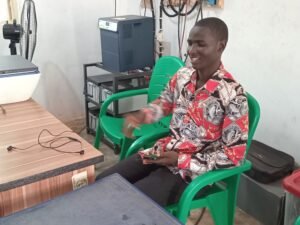
Ayuba Philemon, a resident of HfN and graduate of Accountancy from the University of Benin, and does part-time teaching at the Christlike Secondary schools.
“I thought I would never see a classroom again,” he said.
“But at the camp, I found safety, education, and purpose. From Christlike Primary School through to university, everything was made possible by the Home for the Needy.”
Blessing Moses, displaced from Mubi North in 2015, earned her Bachelor of Nursing Science from Edo University and now volunteers at the camp’s clinic while awaiting NYSC mobilisation.
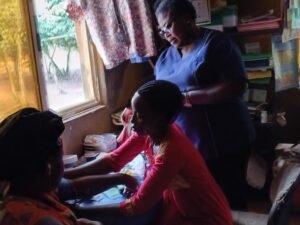
“I enrolled in school immediately after arriving,” she recalled.
“Today, I am a qualified nurse. Giving back through the clinic is my way of saying thank you.”
Obadiah Philemon, who once survived two weeks in the mountains, endured hunger to stay alive, graduated with a Second Class Upper degree in Accountancy from the University of Benin.
He now teaches Economics and Mathematics in the camp’s secondary school.
“There were times when learning meant sitting under trees,” he said. “But this camp gave me a second chance. Now, I help the next generation find theirs.”
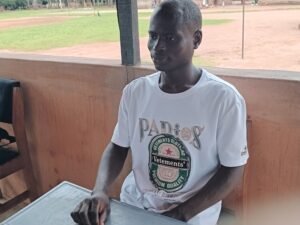
The Power of community support
The camp’s efforts have been amplified by support from local groups such as the Kindness Family, led by Evangelist Naomi Ehigie.
“We first visited through the Jesus Fellowship Prayer Band, and I was deeply touched,” Ehigie said.
“We built a kitchen in 2017, donated utensils, and still provide food and supplies. Every child here deserves a chance.”
Challenges remain
In spite of its successes, HfN continues to face major challenges: inadequate funding, food shortages, limited infrastructure, and difficulties sustaining teacher salaries.
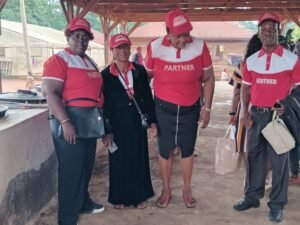
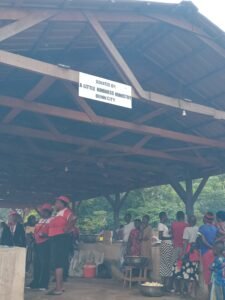
Renovated kitchen at HfN
Classes are sometimes held under trees, and the camp depends heavily on private donations and volunteer support.
Still, the model demonstrates that displacement doesn’t have to lead to despair.
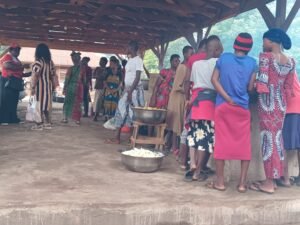
With the right support systems—education, mentorship, and community—IDPs can rebuild their lives and become agents of change.
“Every child on the street has the potential to be a doctor, lawyer, or innovator,” said Pastor Folorunsho. “If you support that child, you could be saving the world from future vices.”
From tragedy has come transformation and in the heart of Edo, a generation of displaced children are now building a future that once seemed impossible.(NAN)
**The story is with the support of the Nigeria Health Watch (NAN) in collaboration with the News Agency of Nigeria (NAN).
***Please, if used credit the writer and the News Agency of Nigeria (NAN).
Published By
-
Deputy Editor in Chief,
Multimedia, Solutions Journalism & Website.

